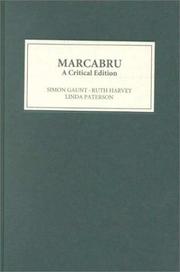| Listing 1 - 3 of 3 |
Sort by
|
Book
ISBN: 1805431749 Year: 2000 Publisher: Woodbridge : Boydell & Brewer, Limited,
Abstract | Keywords | Export | Availability | Bookmark
 Loading...
Loading...Choose an application
- Reference Manager
- EndNote
- RefWorks (Direct export to RefWorks)
New critical edition of complete work of 12c Occitanian troubadour Marcabru, crucial figure in development of European courtly lyric.
Marcabrun, --- LITERARY CRITICISM / Medieval. --- Clerical morality. --- Crusading movements. --- European courtly lyric. --- Medieval Occitania. --- Occitanian troubadour. --- Political poetry. --- Political upheavals. --- Politics. --- Secular ethics.

ISBN: 0859915743 1805431749 Year: 2000 Publisher: Cambridge Brewer
Abstract | Keywords | Export | Availability | Bookmark
 Loading...
Loading...Choose an application
- Reference Manager
- EndNote
- RefWorks (Direct export to RefWorks)
New critical edition of complete work of 12c Occitanian troubadour Marcabru, crucial figure in development of European courtly lyric.
Provençal, Occitan literature --- Occitan poetry --- Poésie occitane --- Criticism, textual --- Critique textuelle --- Marcabrun, --- Translations into English. --- Poésie occitane --- Marcabru, --- Marchabrun, --- Pain-Perdu, --- Pan-Perdut, --- Panperdut, --- Clerical morality. --- Crusading movements. --- European courtly lyric. --- Medieval Occitania. --- Occitanian troubadour. --- Political poetry. --- Political upheavals. --- Politics. --- Secular ethics. --- LITERARY CRITICISM / Medieval.
Book
ISBN: 9780691161051 0691161054 1306640180 1400850258 069117380X Year: 2014 Publisher: Princeton ; Oxford Princeton University Press
Abstract | Keywords | Export | Availability | Bookmark
 Loading...
Loading...Choose an application
- Reference Manager
- EndNote
- RefWorks (Direct export to RefWorks)
"Most classical authors and modern historians depict the ancient Greek world as essentially stable and even static, once the so-called colonization movement came to an end. But Robert Garland argues that the Greeks were highly mobile, that their movement was essential to the survival, success, and sheer sustainability of their society, and that this wandering became a defining characteristic of their culture. Addressing a neglected but essential subject, Wandering Greeks focuses on the diaspora of tens of thousands of people between about 700 and 325 BCE, demonstrating the degree to which Greeks were liable to be forced to leave their homes due to political upheaval, oppression, poverty, warfare, or simply a desire to better themselves. Attempting to enter into the mind-set of these wanderers, the book provides an insightful and sympathetic account of what it meant for ancient Greeks to part from everyone and everything they held dear, to start a new life elsewhere--or even to become homeless, living on the open road or on the high seas with no end to their journey in sight. Each chapter identifies a specific kind of "wanderer, " including the overseas settler, the deportee, the evacuee, the asylum-seeker, the fugitive, the economic migrant, and the itinerant, and the book also addresses repatriation and the idea of the "portable polis." The result is a vivid and unique portrait of ancient Greece as a culture of displaced persons"--
Greeks --- Grecs --- Migrations --- History --- Histoire --- Greece --- Grèce --- Social conditions --- Civilization --- Conditions sociales --- Civilisation --- Ancient --- Greece. --- General. --- Greece -- Civilization -- To 146 B.C. --- Greece -- Social conditions -- To 146 B.C. --- Greeks -- Migrations -- History -- To 1500. --- Regions & Countries - Europe --- History & Archaeology --- Grèce --- HISTORY / Ancient / General. --- HISTORY / Ancient / Greece. --- Ethnology --- Mediterranean race --- Archaic Greece. --- Athenian law. --- Greek antiquity. --- Greek citizenship. --- Greek civilization. --- Greek identity. --- Greek-speaking world. --- Ionian migration. --- L'esprit de retour. --- Mediterranean world. --- adaptability. --- ancient Greece. --- anestios. --- aphrtr. --- apolis. --- asulia. --- asylum-seeker. --- asylum. --- civic identity. --- criminals. --- cultural homogeneity. --- democracy. --- deportation. --- deportee. --- deportees. --- diaspora. --- displaced persons. --- economic migrant. --- economic migrants. --- economic migration. --- entrepreneurship. --- ethnic cleansing. --- evacuation. --- evacuee. --- exile. --- exiles. --- familial identity. --- financial destitution. --- fugitives. --- hostilities. --- human resource. --- humanitarian agencies. --- itinerants. --- land hunger. --- legal battles. --- local sanctuary. --- long-distance travelers. --- mass deportation. --- migrants. --- migration. --- mobility. --- oikos. --- oligarch persuasion. --- overpopulation. --- overseas settler. --- ownership. --- panhellenic institutions. --- phratry. --- phug. --- pioneers. --- polis. --- political identity. --- political opponents. --- political pressure. --- political upheavals. --- portable polis. --- prosecution. --- radical upheaval. --- refuge. --- refugees. --- relocation. --- repatriation. --- resource fluctuations. --- returnees. --- sanctuary. --- servile labor. --- settlements. --- settlers. --- social identity. --- starvation. --- stasis. --- tyranny. --- voluntary flight. --- wanderer. --- wartime evacuations.
| Listing 1 - 3 of 3 |
Sort by
|

 Search
Search Feedback
Feedback About UniCat
About UniCat  Help
Help News
News